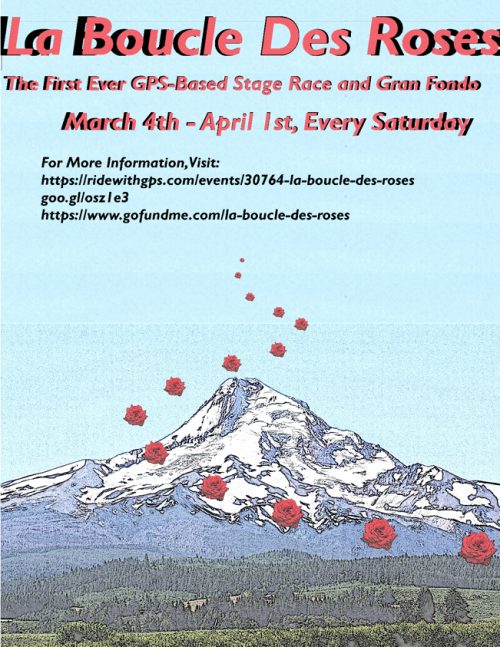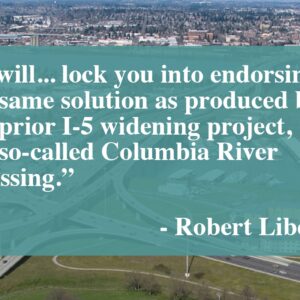
This weekend a new type of cycling event will start on the streets in and around Portland. It’s called La Boucle Des Roses and it’s unlike anything we’ve heard of before.
French for “The Loop of Roses,” La Boucle is an unsanctioned race/ride with five stages that will take place between this Saturday March 4th and Saturday April 1st.
Unsanctioned rides are nothing new to Portland. We’ve seen huge turnouts for the annual De Ronde and its sister ride, La Doyenne. Last weekend there were about 70 people who showed up for the Timber Logjam. “Organizers” of those events simply pick a date and mark a route (both online and on on-the-road), and sit back and let the promotion happen through word-of-mouth. What makes La Boucle different is its presentation as a multi-stage event and its use of an online platform to tabulate times and rankings for everyone who enters — regardless of when they complete the routes.
La Boucle’s organizer Will Hahn says the event is a “stride forward for Oregon cycling.” It’s his response to a recent decline in sanctioned road racing events statewide. A recent thread on the Oregon Bicycle Racing Association email list titled, “State of Cycling, Its Decline, and Events” brought out dozens of voices to hash out the causes and impacts of why people are racing less and why events continue to fall off the racing calendar. Membership at OBRA is down as well and it seems like everyone has an opinion as to why. Ideas I’ve heard include: the difficulty of getting permits for road closures and a lack of affordable and quality venues; a lack of profit for promoters; people doing their own rides and “competing” via Strava; and so on.
Hahn’s La Boucle avoids some of those hurdles (administrative costs) and embraces others (use of technology). The low overhead allows Hahn to manage the race for a relatively low entry fee of $22. The five-stage Baker City Classic by comparison, costs $140. To help raise money for the prize purse, Hahn has set a GoFundMe campaign. So far he’s raised just $20 of his $2,000 goal. To protect himself from legal claims in the event of a crash or other accident, Hahn will require each official participant to fill out a waiver form.
Advertisement
Here’s more from Hahn’s description of the ride on the Ride With GPS event page:
The idea of this race grew out of the desire to grow Oregon bicycle racing from a grassroots level, to promote the tenets of good bike riding and to satisfy the missing holes in the Oregon race calendar. My intent is to draw riders from all walks of life, to pit them against excellent courses that would otherwise be off-limits and create a renewable system of racing that eases the costly burdens of race promotion.
I will describe this as a race, but it is more akin to a mass start Gran Fondo, open to all and free…
These courses are (for the most part) difficult and long. They are all marked with paint, but it is up to you to know the courses before hand. There are no referees or course marshals, no follow cars and no feed zones; other than those provided by yourself. Riders who break traffic laws aren’t following the tenets of good bike racing, sullying the image of cyclists and creating an unsafe atmosphere for other riders, please don’t be this person.
There will be a roll-out at 10:00 am from the bottom of NW Saltzman Road (off Highway 30) for Saturday’s opening time trial stage. You don’t have to be there to have your time counted and the course will be “open” for a one week period. To vye for prizes however, and to be considered an official participant, you must show up to at least two Saturday starts in the five-week series.
For the full details, view the official Technical Guide (PDF).
Credit to Hahn for trying something new. Do you think it will catch on?
— Jonathan Maus: (503) 706-8804, @jonathan_maus on Twitter and jonathan@bikeportland.org
BikePortland is supported by the community (that means you!). Please become a subscriber or make a donation today.





One of main the reason that “official” bike events have insurance and have participants sign a waiver is to protect the entities that own the properties on which the events take place. If you are putting on a century ride you will be required to have insurance to protect the county who manages the roads that the participants ride. This is an innovative event but I suspect that if anyone gets hurt the waiver will unravel very quickly if there is no insurance or permission from the managers of the roads for this event. The reason that most unofficial events don’t have “official” organizers or paid entry is to make it clear to everyone that they are on their own for a personal ride. The minute that someone attempts to profit from an event on public or private land without permission from the landowners there is going to be legal issues if someone gets hurt.
I personally have done many “unofficial” events and have enjoyed them. The old Dalles Mountain 60 was a lot of fun.
The $$ entry fees, $$$ apparel, $$$$ injuries, and $$$$$ delicate bikes might be a start on the issues with amateur cycling. Insiders make srs bsns out of racing around in circles at 30mph, the rest of us see it as an expensive arms race with wargames played out on their kid’s soccer night. Fortunately for cyclocross, the risks are lower and their culture doesn’t take things so seriously.
I’m not averse to competition. Zwift is a non-starter, because I’d rather be outdoors taking in sights. Racing/group riding in a pack with a bunch of people yelling about pulls, leadouts, watching for traffic, stops, etc. doesn’t leave me with time for my thoughts. This sort of virtual racing almost bridges the gap (no pun intended) and scratches that itch.
There could be more to life than chasing PRs and our own personal kudos. A race that isn’t live is still kind of a glorified ITT, but it might be the best we’ve got. I wish them well.
Question Champs, Why isn’t there a P-T-S to match the STP?
I was just wondering. I figure Sdot people say one thing, do another.
Sdot does not do pedestrian very well, unless commercialized.
Wow. Stuffy much?
Unlike De Ronde, The Dalles 60, etc, this event charges a fee and is considered a “race” which by having it unsanctioned, sets a dangerous precedent on so many levels imho as has been beaten to death on OBRA chat.
Speaking of unsanctioned and doing something outside of OBRA, why did the “organizer” blatantly rip off OBRA’s waiver (even leaving a link to their concussion page)?
https://bikeportland.org/wp-content/uploads/2017/03/La-Boucle-Des-Roses-Technical-Guide.pdf
Thankfully the kickstarter amount raised so far sums up the interest in an event like this…
Yes. There is a big difference with someone saying “Here is a route. I’m going to ride it on 10:00 on Sunday with some of my friends.” and “Here is a route. Pay me $20 and I will share some prize money with participants.” In one case you are hanging out with some friends. In the other case you are an organizer just like someone putting the Shamrock run or Monster Cookie ride.
If the organizer does not have many assets there is probably a pretty low chance that they would be sued if a participant ran into someone walking a dog or some kid playing in the street but I personally would not want to have my wages garnished for the rest of my life because a jury decided that I organized an event but did not follow any of the state, county, or city rules for notification, flagging, and other safety regs which caused a bystander to be injured. When you have permits, insurance, and follow the state laws for organizing events on public streets you will have an excellent chance to convince a jury that you did all you could to make things safe for bystanders.
So why not organize a real stage race? This seems like the dilettante special, where you can pretend to be a racer but not have to commit anything to it. A lifestyle event rather than an actual race. Which is fine, but don’t call it a race. And getting around the legality and insurance requirements this way does open a whole kettle of fish. It someone gets hurt, can you guarantee that their family will not take action? This is just scratching the surface. It’s illegal to hold races on Oregon roads without a permit. If you charge an entry fee you open another kettle of, well you know.
Again, why not organize a real race?
I don’t understand how you can call an event a race and charge an entry fee, but not be required to get a permit.
Also, sanctioning bike racing on a multi-use path like the Banks-Vernonia trial seems dangerous and irresponsible.
From reading the thread on OBRA’s site, it sounds like the organizer may be changing the format to simply a “spirited group ride”, and any donations would go towards prizes given out at the celebration held at Western Bike Works at the end. Not sure if that would free them up from liability or not. I think the concept is cool overall, even if the execution wasn’t thought out as thoroughly as it could have been.
The litigious nature of life in America is a big part of what killed the Slug Velo rides of the previous decade.
I created Slug Velo as an INFORMAL, fun activity for adults desiring a social ride at a mellower pace.
The first ride was just a ride: meet somewhere, have some coffee, and go ride around town. Thirty people showed up and we had fun. I offered a ride each month for the first two years.
But immediately after that first ride, I was warned by lawyer friends to have waivers on hand and to require helmet use for everyone. So I did.
I was also strongly advised to purchase an insurance rider to cover the possibility of getting sued (because any waiver can be challenged in court). I didn’t carry any sort of personal insurance so I skipped the rider.
In the end, Slug Velo died because it got too formal, because parents brought little kids along who were too young to safely ride in traffic and refused to keep an eye on them (“it’s your ride, you should be responsible for my child,” more than one parent told me — even after signing a waiver). It got to be a drag dealing with such litigious, entitled parents. Not surprisingly, no one else wanted to step up and host a ride after that. So four years after I started Slug Velo, I shut it down.
Today Slug Velo exists as a very occasional (1-2x/year at most) private event. I invite only a few friends I know and there are NO waivers. I will never host a formal organized ride that’s open to the public ever again. Too much hassle, too little support and too much legal risk.
I think I understand why there are people who would welcome more unsanctioned events, races or otherwise.
But be warned! As soon as you try to make an unsanctioned event “public” you run into all sorts of headaches, legal and otherwise. Each organizer has to decide whether or not it’s worth the hassle and the risk.